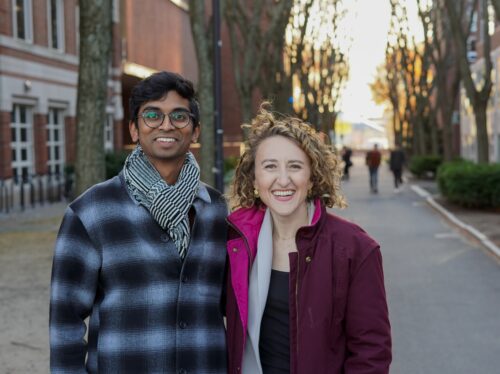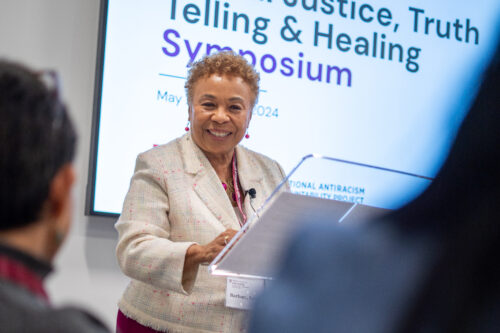Speaking at a symposium examining global processes of truth-telling and healing, hosted by the Ash Center’s Institutional Antiracism and Accountability (IARA) Project, Congresswoman Barbara Lee (D-CA) discussed her decades-long career fighting for racial justice, from the anti-apartheid movement to pushing for reparations for Japanese Americans.
“[I’ve] been trying to push the Democratic Party to be more progressive, inclusive, and democratic. That’s my job,” she stressed at the Global Justice, Truth-Telling, and Healing Symposium at the Kennedy School, which gathered several dozen leaders from around as far away as Aotearoa New Zealand and Rwanda, working to document, memorialize and seek accountability for violent legacies of the past. Over two days, participants gathered to share their insights and offer input into a major study to be released this summer, co-authored by Professor Khalil Gibran Muhammad and Dr. Gloria Yayra A. Ayee on the subject.
Lee, a senior House member from the San Francisco Bay area and a longtime foreign policy voice on Capitol Hill, detailed the onerous process of seeking racial justice in the United States — while acknowledging the long road ahead. Even in progressive-leaning California, one of the few states to establish a task force on reparations, “we’re struggling through how to implement the findings,” she admitted. “But you see how long it takes in this country — and in my own state — just to move forward on these issues because they’re so tough.”
She recalled the “enlightened, progressive people” of Berkeley and Oakland who were shocked by George Floyd’s murder. “People in America do not understand or know the impacts, the trauma, the policy, the institutional DNA that’s in this country as it relates to genocide, as it relates to the impact of slavery and all of the other human rights crimes against humanity that are institutionalized in American policy in the private sector and in the public sector,” she said.
In the wake of the 2020 racial justice protests, Lee introduced federal legislation to establish a United States Truth, Racial Healing, and Transformation Commission. “We decided transformation because there’s really nothing to reconcile in the United States. Transformation is reparations,” she noted. “That’s how we repair the damage in America. Otherwise, 100 years from now we’ll still be going around the clock and we’ll still be dealing with setbacks.”
Lee also serves as senior Democrat on the House subcommittee that funds the U.S. Institute of Peace, a quasi-public foreign policy think tank based in Washington, D.C. She noted that the institute’s mandate is to assist other countries to establish truth commissions, but they have no jurisdiction over the United States. In fact, she shared how she received substantial pushback when it came to getting the institute to examine America in the same light as other nations.
Calling Muhammad and Ayee’s study “a landmark report,” she hopes to send the findings to the White House and the U.S. Institute of Peace to “make our argument for a [U.S.] truth commission and reparations even more powerful.”
Finally, Lee urged action from everyone in the room. “What you have to do is get it to your senators and to your House members and demand that they support HR40 [a bill to study reparations] and HR44 [another bill to establish a national truth commission], that they engage other members in the delegation.” She continued, “Don’t see this as separate from the political dynamics of what’s happening in this country in terms of voter registration. [Hold] your members of Congress accountable to establishing both locally and nationally these commissions and HR40 — and [make] sure that they understand that you’re not going to back down, and we’re going to keep at it.”




